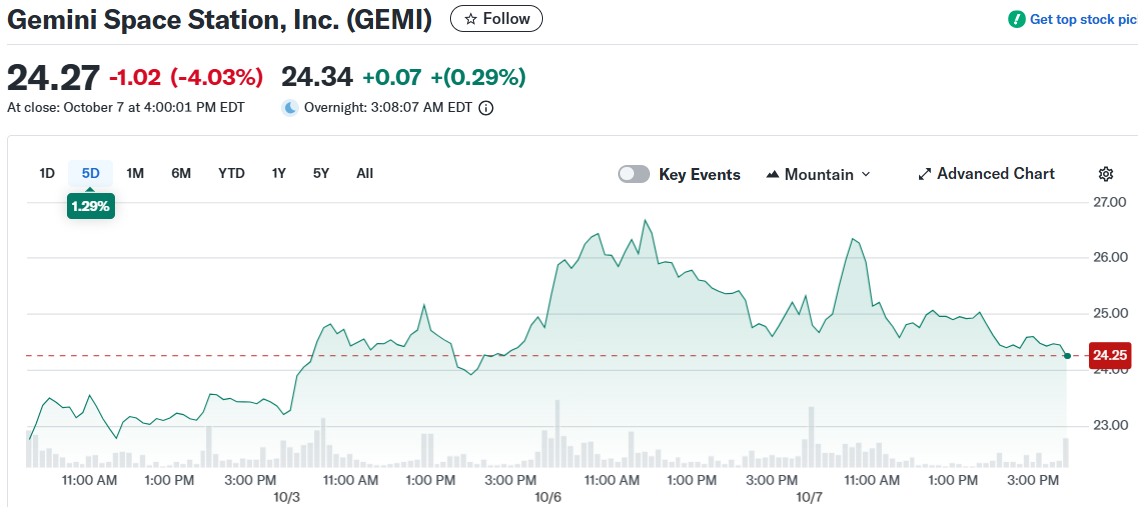TLDR
- Gemini Space Station (GEMI) trading at $25 with analyst targets averaging $30-$31.50, suggesting 20-30% upside potential
- Crypto rewards card sign-ups surged from 8,000 in 2024 to 31,000 by August 2025, with 50% converting to active traders
- Company secured EU MiCA license in August, enabling staking and derivatives expansion across European markets
- Eight analysts initiated coverage: six buy ratings, two hold ratings following IPO blackout expiration
- Stock debuted at $28, peaked at $46, but fell to $22.25 low before current recovery
Gemini Space Station launched its initial public offering last month with shares priced at $28. The stock surged to $46 on its first trading day before declining sharply.

The cryptocurrency exchange now trades around $24 per share. The stock hit a post-IPO low of $22.25 last week.
Wall Street analysts began coverage this week after the mandatory IPO blackout period ended. Six firms issued buy recommendations while two gave hold ratings.
Average price targets range from $30 to $31.50 per share. This represents potential gains of 20% to 30% from current levels.
Mizuho Securities assigned a $30 price target. Needham’s John Todaro set the highest target at $42.
Crypto Card Becomes Growth Engine
The Gemini Credit Card has emerged as the company’s primary growth driver. Card sign-ups jumped from approximately 8,000 in 2024 to nearly 31,000 by August 2025.
Users earn bitcoin, ether, or alternative cryptocurrencies as cashback on purchases. Rewards transfer instantly into Gemini exchange accounts.
Mizuho analysts Dan Dolev and Alexander Jenkins identified a “flywheel effect” in the business model. Roughly 50% of cardholders become monthly active exchange traders.
Cantor Fitzgerald’s Brett Knoblauch reported nearly 45,000 sign-ups in July and August combined. The company is positioned to triple its user base this year.
The card features no annual fees and no balance requirements. Cardholders can customize which cryptocurrency tokens they receive as rewards.
European Markets Open Through MiCA
Gemini obtained Markets in Crypto-Assets licensing from the European Union in August. The MiCA framework permits regulated cryptocurrency services throughout EU member nations.
This license allows Gemini to launch staking services and crypto derivatives products. These offerings were previously unavailable in European territories.
KBW analysts expressed more cautious views despite growth prospects. The firm recognized Gemini’s superior growth trajectory compared to competitors.
However, KBW projected continued unprofitability throughout the forecast window. This assessment contrasts with more bullish analyst opinions.
Recovery from Past Challenges
Gemini faced reputational damage in 2022 when the FTX collapse caused liquidity issues. Customer assets were frozen through partner Genesis Capital.
The company recovered over $2 billion for investors through legal proceedings. Gemini contributed approximately $50 million from company funds.
Monthly active users are now growing as customer confidence returns. The platform has regained trust after resolving prior issues.
Nasdaq made a strategic investment coinciding with the public offering. Gemini founders Cameron and Tyler Winklevoss continue leading the company.
Federal regulatory leadership now includes crypto-friendly officials like SEC Chairman Paul Atkins. President Donald Trump and family members have invested in cryptocurrency.
Truist Securities analyst Matthew Coad views the post-IPO decline as a buying opportunity. His $31 price target matches analyst consensus.
Competitors Coinbase and Robinhood have posted stronger 2025 returns. Coinbase gained over 50% while Robinhood surged nearly 300%.
Recent crypto IPOs including Circle Internet Group, Bullish, and Galaxy Digital outperformed Gemini. Bitcoin reaching record highs has boosted the sector overall.





